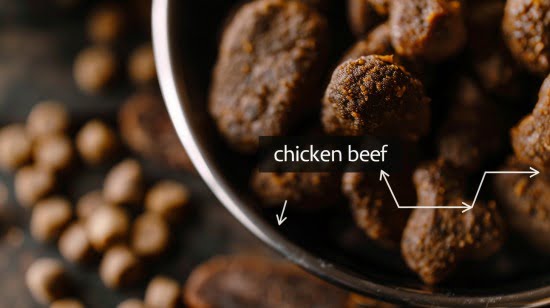Ever notice how a bowl of that same old kibble can be met with either a wagging tail or a turned-up nose? Our pups can be total enigmas sometimes! But the right food doesn’t just make them happy; it’s the key to their long-term health. So, how do you find your dog’s Goldilocks bowl – the food that’s “just right?”
Understanding Dog Nutrition
Think of your dog’s food as the building blocks for a strong, healthy body. They need a mix of stuff we do too – protein for muscles, fats for energy, and carbohydrates for fuel. But they also need the right vitamins and minerals to keep everything working as it should. Some dogs even need a little extra fiber to keep their digestion on track!

The Role of AAFCO
You can’t judge a dog food by its cover, that’s for sure! That’s where the AAFCO (Association of American Feed Control Officials) comes in. Their job is to set standards for pet foods. Look for an AAFCO statement on the bag – it means the food has at least the minimum goodies your dog needs to thrive.
Dispelling Common Misconceptions about Dog Food
Navigating the world of dog food can be tricky, especially with the prevalence of online misinformation. Let’s address some widely held beliefs and separate fact from fiction:
Grain-free diets are inherently superior.
Grains can be a valuable source of carbohydrates and fiber for dogs. While certain dogs may have grain sensitivities, a grain-inclusive diet might be completely suitable for your pet. Consult your veterinarian to determine if a grain-free diet is truly necessary.
Higher price equates to higher quality.
While premium brands often use higher-quality ingredients, some budget-friendly options can provide comparable nutritional value. The key is learning to decipher food labels, focusing on the ingredient list rather than solely on price.
Homemade food is always the healthiest option.
Preparing a nutritionally complete and balanced homemade diet for your dog requires careful research and often the guidance of a veterinary nutritionist. Ensuring your dog receives all necessary vitamins and minerals is crucial. Commercially prepared foods often offer a more consistent and reliable source of balanced nutrition.

5 Vet-Approved Tips for Choosing Dog Food
Prioritize AAFCO-Approved Food
Back in the day, there wasn’t much ensuring dog food was actually… good for dogs. That’s why the AAFCO stepped in to set standards. Look for their “Nutritional Adequacy Statement” on the label. This means the food meets your dog’s needs for their particular stage of life (puppy, adult, or senior). It’s important to note that “human-grade” isn’t held to the same nutritional standards as pet food with AAFCO approval.
Decode the Dog Food Label
That list of ingredients and percentages on your dog food bag might look intimidating, but it’s your key to knowing what’s really inside. Here’s how to crack the code:
- Ingredients List: The good stuff comes first! Look for a named meat source (like “chicken” or “beef”) as one of the top ingredients.
- Guaranteed Analysis: Tells you how much protein, fat, fiber, and moisture are in the food. Your vet can help you figure out what numbers are ideal for your pup.
- Nutritional Adequacy Statement: This is your AAFCO seal of approval, remember?

Choose the Right Food for Your Dog’s Life Stage
We don’t eat the same food our whole lives, and neither should our dogs! Here’s a quick breakdown:
- Puppies: Need lots of calories and nutrients to support all that growing! Look for puppy-specific formulas.
- Adults: Maintenance is the name of the game. Their food should keep them at a healthy weight and provide energy for their lifestyle.
- Seniors: Older dogs often benefit from formulas that support their joints, cognitive function, and any health issues they might have.
Address Your Dog’s Health Concerns – Specialized Diets
Is your dog an allergy-prone pup, or maybe needs to shed a few pounds? Specialized diets can make a world of difference.
- Allergies & Sensitivities: Limited-ingredient or hypoallergenic foods might be your dog’s lifesaver.
- Weight Management: Specially formulated foods help dogs reach and maintain a healthy weight.
- Other Conditions: There are foods for kidney issues, heart problems, and more. Always work closely with your vet for these!
Is your dog an allergy-prone pup, or maybe needs to shed a few pounds? Specialized diets can make a world of difference. If you suspect your dog has allergies, resources like the American College of Veterinary Dermatology are excellent for learning about common allergens and specialized food options.
Consider Feeding Methods and Portion Control
It’s not just what they eat, but how they eat it!
- Dry Kibble: Convenient and helps clean teeth.
- Wet Food: Great for picky eaters or dogs needing extra hydration.
- Combination: Offers the benefits of both!
- Portion Control: Check the bag, but remember, it’s just a starting point. Your vet can help you determine the perfect amount for your pup based on their weight, age, and activity level.
FAQs
Can I mix different brands of dog food?
Yes, generally it’s safe to mix dog foods. Introduce the new food gradually to avoid digestive upset, and ensure both foods offer balanced nutrition. If your dog has sensitivities, consult your vet for guidance.
How do I make sure my dog gets all the nutrients they need?
Choosing an AAFCO-approved food is a great start. Look for signs of good nutrition, like a shiny coat, healthy weight, and good energy levels. Regular vet checkups help monitor your dog’s health and catch any deficiencies early.
Is homemade dog food a healthier option?
Homemade food can be healthy, but only if meticulously planned with the help of a veterinary nutritionist. Ensuring your dog gets all their necessary vitamins and minerals is challenging. Commercial foods designed by experts often provide a more balanced and reliable source of nutrition.
My dog is a picky eater! How do I find food they’ll enjoy?
Try these tips: introduce new foods slowly, consider adding warm broth or toppers, experiment with wet food or fresh food options, and consult your vet to rule out any underlying medical causes for the pickiness.
Are there specific ingredients to avoid in dog food?
Prioritize avoiding artificial colors, flavors, and sweeteners. Be cautious of vague “meat byproducts,” as they can be low quality. Remember, some ingredients are fine for most dogs, but might cause allergies in others.
Conclusion
Choosing the right food for your dog is one of the best ways to show your furry friend how much you care. Remember, prioritize AAFCO-approved food, read those labels carefully, consider your dog’s life stage and any health concerns, and don’t underestimate the power of portion control!

Healthy dogs mean happy dogs, and that makes me happy! I’m here to share all the tips for keeping your best furry friend in top shape, from puppyhood to their golden years.


